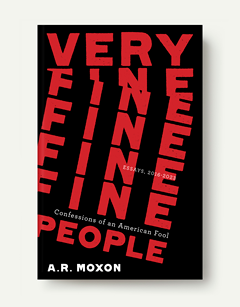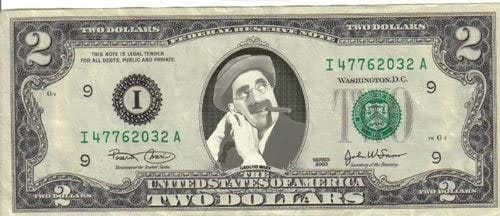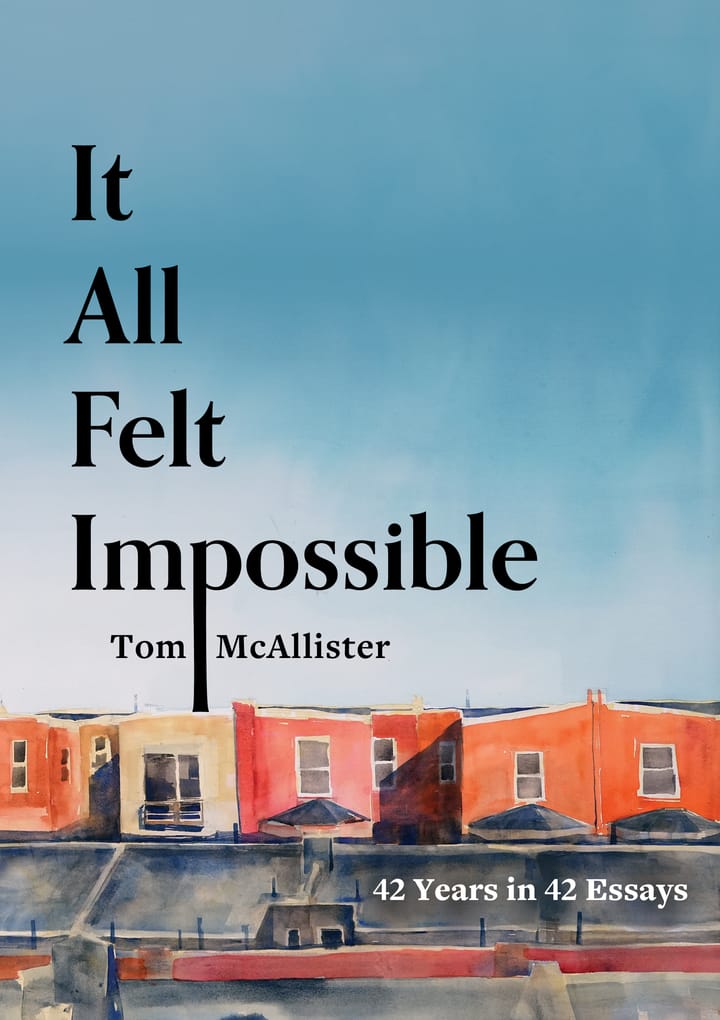My Poochie
Permissionist debaters supporting eliminationist intentions. A tale of a guy named Poochie, and the margins of Permission (1 of 3).

I know a guy about my age (which is my forties). I don’t want to give his name, because I don’t want to promote him in any way. Let’s call him Poochie.
Poochie has a podcast. I know it’s hard to believe this. I can even hear your incredulous retort—A.R. Moxon, how in the world did it come to be that you, a white guy in your forties, knows a white guy in his forties with a podcast??— but I really do. This particular podcast is about reducing political polarization, which my acquaintance Poochie considers to be the primary underlying political problem facing our society. Poochie thinks this problem is caused by both sides, and if you have read me for more than a few minutes you probably know what I think about that.
Anyway, Poochie has a few pet topics on the subject of polarization that he beats like a tin drum, and if he sees you mention one of them out there on the old social medias, he’ll put a copy-and-pasted response into your mentions, informing you that you might be interested in his insights on the topic, which usually means his podcast episode on that topic. The episode in question will invariably have come to the regrettable conclusion that the main problem we face as a nation is not rising fascist supremacy, but the fact that we’re so angry about, you know, stuff. Yes, and if you look at his feed, you’ll see he’s copy-and-pasted the exact same self-promotional reply dozens or even hundreds of times a day. This is how some people spend their time out on the Internet. I try not to judge, but to be fair, in some cases I don’t try very hard.
Anyway, one of the topics about which Poochie likes to advise people is this idea of anti-wokeness, about which I’ve written a bit. For a brief refresher, “woke” is a term that Black people coined many years ago to describe their growing awareness of the systemic nature of injustice in general and white supremacist racism in particular. And some years ago, white supremacists who wanted to defend the systemic nature of injustice in general and white supremacist racism in particular, and who knew that awareness represents the beginning of the end for these sorts of things, did what such people usually do when they see something Black people own that they want to use for whatever reason: they stole it. They claimed “woke” for themselves and used it to mean a whole raft of things that boil down to “the existence of people we supremacists do not consider to be valid is not only annoying but threatening, not only threatening but existentially dangerous, and therefore those people deserve even more accelerated and entrenched systemic abuse and state-sanctioned violence.” And now in many states there are laws that make it dangerous for teachers to teach about Black history, and for trans people to live at all, and on and on.
So that’s “woke” for you. Anti-woke, as you might guess, is simply the state of being against things that are “woke” by supremacist definitions. Practically speaking, anti-woke is an organized and energetic supremacist opposition to awareness in general and against the demand for equality and diversity and inclusion and equity in particular. For a lot of people, it’s a way of saying “I don’t like Black (or gay or trans or whatever) people to exist without my permission” without actually saying that—and it’s just the newest way of saying it; there have been many others. Once you can say that you’re anti-woke instead of saying you’re a supremacist, then you can say all sorts of supremacist things, and now white supremacists are blaming the very existence of Black pilots for plane crashes, in order to make the larger case that Black people should not be hired for any sort of important (e.g. well-paying) jobs, for example. And they are making that case to establish themselves as the people who should get to bestow permission upon what jobs Black people should be permitted to have, and other ways that Black people and other types of people that supremacists do not deem valid should be allowed to exist in society. It’s a very popular topic on the airwaves these days.
People who think others need their permission to be allowed to exist are supremacists, incidentally, because among other things they think that their own psychological comfort within their own made-up worldview is more important other people’s actual lives.

I’m publishing a book of essays called Very Fine People: Confessions of an American Fool, and my readership is helping me do that. If you want the details on how you can get in on that and get a signed copy and my thanks in the acknowledgements section of the book, click this link.
To return our attention to Poochie for a moment, I should mention where he stands politically. Poochie would have you know that he’s a liberal guy who is on the side of justice and liberation movements, as a general rule. He defines this, broadly speaking, as voting mostly for Democrats and not voting for Donald Trump. If you’ve observed Democrats for a few seconds, you’ll know that this is not a particularly reassuring bona fide that somebody is 100% on your side when it comes to justice and liberation movements, but it is at least true that Democrats do not tend to refer to themselves as anti-woke and often can be seen pursuing diversity and equality and inclusion and sometimes even equity in tangible ways, and can sometimes even be found being diverse. Poochie will also make sure you know that he himself isn’t anti-woke. He’s just anti-anger; on this specific topic, he’s against people being angry at the rhetorical and political goals of people who call themselves anti-woke, because anger increases polarization, and polarization, again, is the true danger.
In the mentions of various people’s social media, Poochie wants you to know, dozens and hundreds of identically-phrased times, that there are actually perfectly understandable reasons that somebody might be anti-woke, and pretty much every time he says that, he also says that in order to understand the anti-woke position, you might be interested the work of John McWhorter.
John McWhorter does indeed seem to be some form of something called “anti-woke.” He wrote a book called Woke Racism, written (as I take it from summaries) in opposition to the entire project of antiracism, and which (again, as I take it from summaries) positions antiracism as an effort that actually increases racism. He is an associate professor of linguistics at Colombia University, which is a place anti-woke people would like you to know nobody is allowed to express anti-woke thoughts without having their career destroyed, and he seems to be enjoying a nice career there, and good for him I say. He’s published extensively and his credits are impressive. If you read his Wikipedia, you get the impression of a smart guy, somebody who could wipe the mat with his opposition in a structured debate, at least if that opposition was an average dipshit like me.
McWhorter is also a Black man, it just so happens.
Now, I want to be clear that I haven’t read John McWhorter’s stuff, so I can’t really comment on it, and I don’t have a strong enough sense of his premise to know if what he means when he says “woke” aligns with what your average white supremacist means when they say it. And I really have no standing to question the path by which a Black man in the United States came to his understanding of racism in the United States, or what it is to be Black in the United States, nor do I have any desire to do so.
Maybe someday I really should do what Poochie recommends, and read John McWhorter, and maybe I’ll learn something new. The summary on Wikipedia doesn’t leave me too hopeful on that score, because it sounds like stuff I’ve already heard before from people who would rather not be bothered about injustice, but I’ve been wrong many times before and I sure don’t know everything there is to know. My point is that by bringing up John McWhorter today, I’m not interrogating or critiquing his premises or his intentions, other than to note the fact that he appears to hold some sort of opposition to some version of something that he calls “woke.”
The reason I want to note this is because I am interrogating and critiquing Poochie, and why it is that he seems so fixated on McWhorter.
Listen: Poochie is not the only Poochie; there are tons of them out there. Poochie is just my Poochie, the one I know best, or at least the one I know most. My Poochie isn’t even a very prominent or successful Poochie, which is I guess why he feels compelled to spam social media accounts, even those of fellow un-prominent people such as myself, in order to get attention for his Poochie anti-anger podcast.
So I’m thinking not about John McWhorter but all the Poochies out there, and the fact that all these Poochies have decided that the thing to combat is not systemic injustice but the anger people feel toward those who promote and defend systemic injustice, and the way my Poochie does this is by utilizing a very common strategy, that is, seeking such people out and spamming them with the message that actually those people have an understandable perspective if you’ll just stop to understand it, and attempting to prove this not by advocating for anti-wokeness himself, but by pointing to a version of anti-wokeness written by somebody who just so happens to be Black, who might not even be making the same rhetorical points as anti-woke supremacists, and (and this is the key) using him as a stand-in for an anti-wokeness movement that is observably supremacist—a move that serves to cover the entire observably supremacist anti-woke project with a sort of exonerating blanket that is not only understandable, but Black.
And I’ve never observed my Poochie—who again I feel I must reiterate is not anti-woke and he’ll be sure to tell you that he only finds anti-woke rhetoric understandable and apparently so compelling that he will pester random internet strangers to read about it—recommending any of the many Black writers and thinkers who explain in great researched detail how and why the anti-woke project, as practiced by many racists, actually is racist, and the historical and sociological underpinnings thereof.
No, Poochie doesn’t seem to be interested in understanding all of those other Black voices on the topic of what “woke” once meant before it became “wokeness,” and what it has been made to mean by bad-faith actors, and what all of that suggests about the way that supremacy works, or anything else that any Black voice who opposes the anti-woke movement has to say about supremacy. He doesn’t need to, because he’s found a Black voice, John McWhorter, to whom he can point again and again and again, in order to buttress Poochie’s case, which is that anger in response to injustice’s violence is a far more present threat and a far greater danger to society than the violence of injustice itself, because to Poochie, polarized anger is not an outcome of injustice and violence, but rather its cause.
It never seems to occur to Poochie that the reason the people he claims he agrees with are so angry is not because they don’t understand the argument of the anti-woke supremacist spirit, but because they do understand it. This suggests that Poochie actually doesn’t understand the position he says he agrees with, or at least he never gets around to understanding it, preferring instead to understand the view that he claims he opposes—understand it so much in fact, that what he spends his time doing is defending and promoting it.
It almost seems as if what Poochie’s anti-anger project is doing is expanding the margins of permission for those who would defend and promote the systemic injustices that are the cause of that anger. Maybe he doesn’t intend this. I can’t say with certainty what his motives are. But I can say with certainty what my motives were, back when I believed that our system was inherently just, and that racism was a conquered thing of the past best examined in history’s rearview mirror, and that polarization was a more present threat than injustice.
I felt that way because, if that were true, then creating a world of justice would require nothing of me, and any instance of injustice was just that—an instance, a blip that our nearly perfected and self-perfecting system would correct automatically, and something that did not obligate me at all.
Learning differently has not been comfortable. It’s involved learning to listen to voices that tell me things I didn’t know and that I don’t want to hear.
So maybe my Poochie isn’t deliberately defending and promoting white supremacy, in his deepest heart. Maybe he’s like me. Maybe he just likes being comfortable.
After all, who doesn’t like comfort?
Why am I telling you all this?
I guess it’s because I’ve been talking lately about the bad-faith tactics of supremacy.
But this essay grew in the telling. It’s too long to ask nice people to read it all at once. I’m going to send it out in parcels, one each morning, for the next three mornings.
Part 2 will explain why Charlie Kirk is in that picture up there. Won’t that be fun?
See you tomorrow.
The Reframe is supported financially by about 5% of readers.
If you liked what you read, and only if you can afford to, please consider becoming a paid sponsor.
Click the buttons for details.
Looking for a tip jar but don't want to subscribe?
Venmo is here and Paypal is here.
A.R. Moxon is the author of The Revisionaries, which is available in most of the usual places, and some of the unusual places, and the upcoming essay collection Very Fine People, which you can support right here. He is also co-writer of Sugar Maple, a musical fiction podcast from Osiris Media which goes in your ears. You say tomatoes and he says tomatoes, you say potatoes and he says potatoes; tomatoes, tomatoes, potatoes, potatoes, this lyric doesn’t work when written.




Comments ()